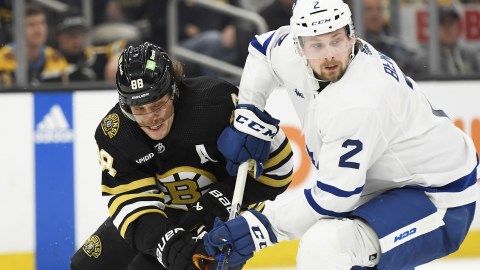WILMINGTON, Mass. — The Bruins are about to skate into a trap.
It's not a surprise ambush, though. They know exactly what they are about to face. The dreaded 1-3-1 trap of the Tampa Bay Lightning awaits them in the Eastern Conference final.
"They're very defensive-minded, and obviously it's worked for them," Bruins forward Gregory Campbell said. "They've shut down some pretty good offensive teams. It's going to be a challenge for us. We'll have a game plan for that. They're not giving up much, so we'll really have to work for our chances."
The Lightning have used the 1-3-1 system to knock off Pittsburgh and Washington in the first two rounds, as first-year head coach Guy Boucher has all of the Tampa players buying into the merits of this variation on the neutral-zone trap.
"The thing you see is that everyone on their team has bought into it," Bruins defenseman Adam McQuaid said. "They force a lot of turnovers and they're very sound in their positional game. We'll probably work on a few things to give ourselves the best chance to fight through it."
So what exactly is the 1-3-1? It's best to find out now, because in a copycat league like the NHL, it's sure to be taking the league by storm next season if the Lightning can use it to reach the Stanley Cup Finals.
The first "1" represents the lone forechecker sent in deep. His role is less to pressure the puck and create turnovers himself and more to funnel the opposing team's breakout toward the boards, where the next layer of defenders is waiting to clog up any attack at center ice. The other two forwards and one defenseman form the "3" as they line up spread across center ice, with the final "1" the last defenseman further behind them in a sort of rover role.
The idea is to slow the opposing team's advance, not allow the opposition to gain the offensive zone with any speed or momentum and to force turnovers in the neutral zone that can be quickly transitioned into counterattacks.
"Well if you get caught flat-footed, I think you are playing into their strength," Bruins coach Claude Julien said. "If you create turnovers you are obviously going to pay for it, so those are two of the main things you have to be careful about when they play that system."
The approach is not that dissimilar to the system Montreal employs, which is hardly surprising, since Boucher went to Tampa after coaching the Canadiens' AHL affiliate in Hamilton. But the Lightning are even more patient in sitting back in their defensive shell, and with the likes of Martin St. Louis, Steven Stamkos and Vincent Lecavalier, they have offensive weapons that are even more dangerous when the opportunity to counterattack arises.
"We saw Montreal sit back, but I think [the Lightning] sit back even more," Julien said. "And they are even deeper, so the one thing they do is once they turn that puck over, they counter quickly. It is going to be really important that we minimize those [turnovers] and obviously you have to create some speed through the neutral zone because standing still, you're a dead duck."
The Lightning aren't a one-trick team though. They vary their approach and disguise their tactics well enough to keep opponents guessing.
"[We] talk a lot about the neutral zone, and that's one of their strengths," Julien said. "And not only do they play a certain way, but they alternate. You won't always see the 1-3-1, you might see that 1-2-2. They try to keep the team on their heels there a little bit with that. And obviously in the offensive zone, a lot of pucks are going to the net. They always have somebody going there. They're really a driven team and they've made it hard on teams they've played against so far in the playoffs and have had success at it. So we're aware of it."
Bruins general manager Peter Chiarelli isn't even sure the 1-3-1 label is completely accurate in describing what Tampa bay does.
"They work really hard and I think whenever you see them speaking about the game they just played or commenting on it, inevitably they speak about the system and the structure," Chiarelli said. "And you watch the play closely and they have, it's not a funky system. I think it's a 1-4, they call it a 1-3-1 or even a 4-1. They sit way back and they pounce and it's hard to get through it. And then everything goes to the net when they have the puck. Everything goes to the net and they overload defensively.
"It's not conventional, but they have guys who are dangerous, they have some size and they have a hot goalie. And they've got a very good coach," he added. "I think it's going to be both a tactical series and a heavy series."
There are ways to beat Tampa's gridlock in the neutral zone. The key is to generate speed through center ice and get the puck in deep behind the defense. Dump-and-chase hockey isn't the most electrifying style to watch, but it can be effective against such a defensive scheme, especially since the Lightning don't have the speed and skill on the blue line that they do up front. Winning the races to the pucks and gaining control in deep off those dump-ins is vital.
"It's kind of similar [to Montreal]," Campbell said. "They have three guys sitting back and when they force you to dump the puck, they always have a defenseman that goes back and is ready to retrieve that puck. That's our task here. We're going to have to continue doing what we've done the last two series, especially what we did against Montreal and use the speed that we have and get the puck deep and play to our strengths."
The Bruins are prepared for the tactics Tampa Bay will throw at them. But beyond the systems and structures, the games will be decided first and foremost on effort and intensity.
"I think more than anything, they're a hard-working team, a team that's really relying a lot on how hard they play and how hard they battle," Campbell said. "For us, it's matching that and rising above it. I think you can talk about systems all you want, and we will have our game plan for that, but that means little if the intensity and the work ethic's not there."



